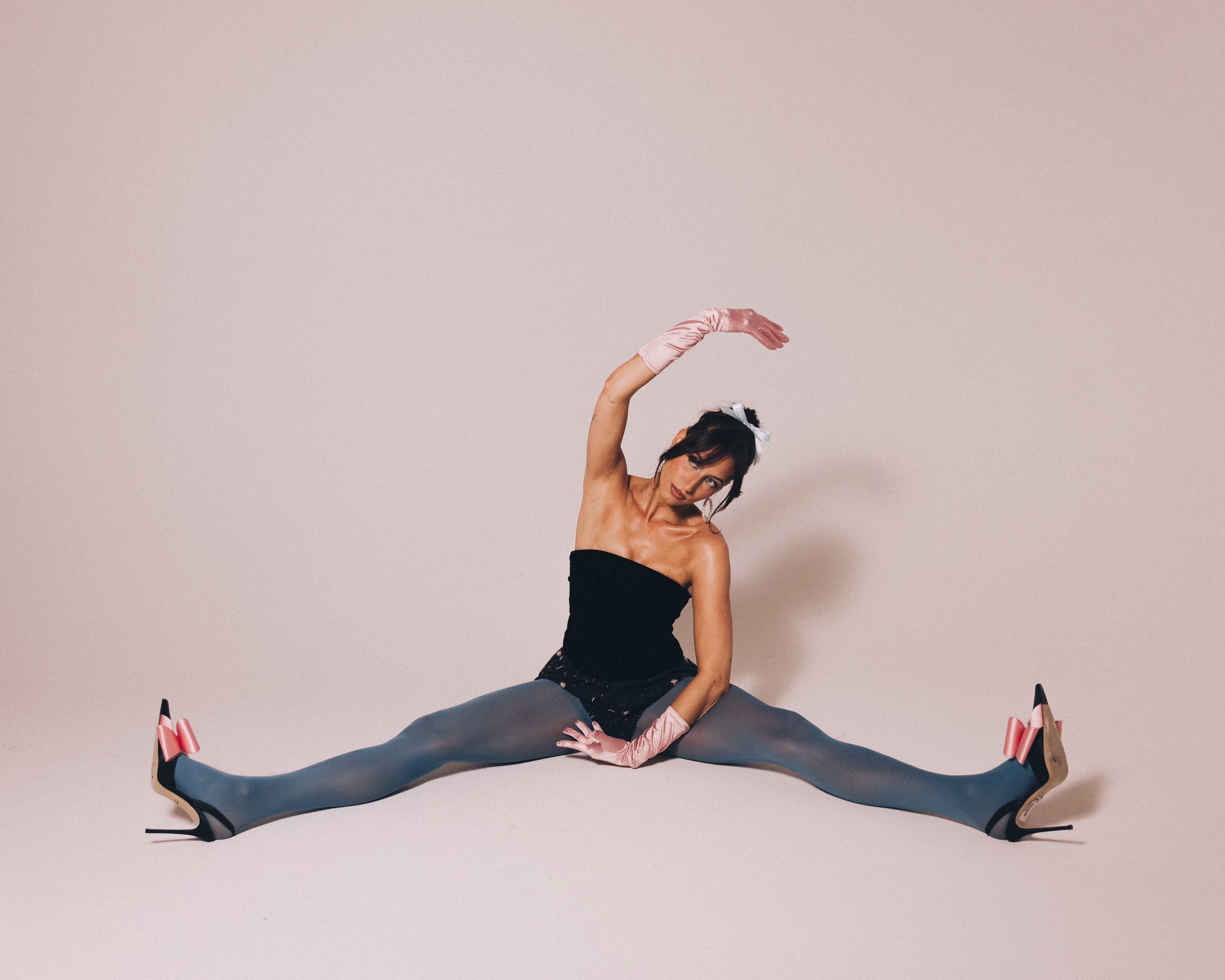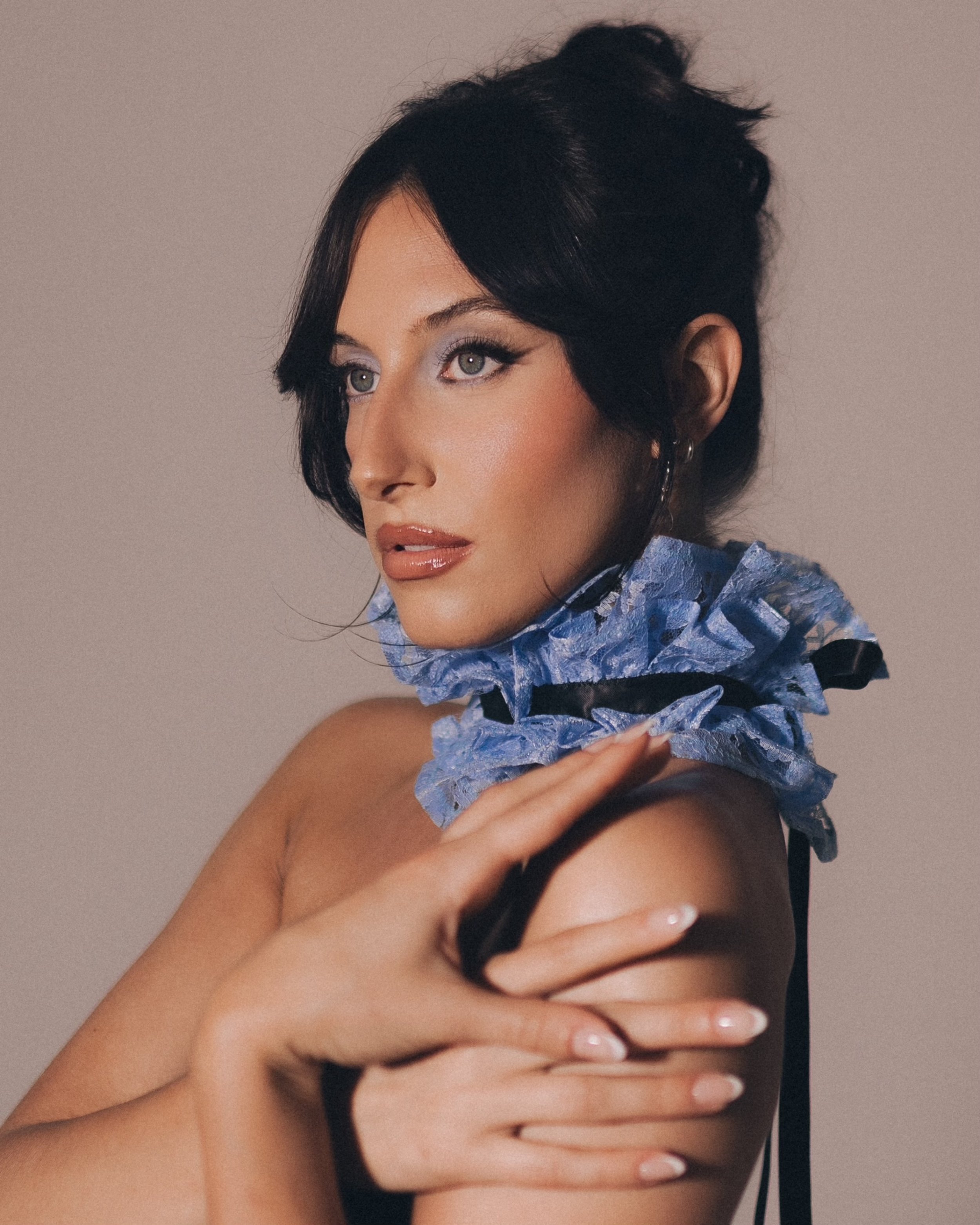Q&A: Nora Mae Blends Heartbreak and Heritage into a Cinematic First Act with “The Avoidant”
INTERVIEW
INTERVIEW
☆ BY SHEVON GREENE ☆
Photo by Nesrin Danan
WITH A VOICE AS VELVETY AS IT IS VULNERABLE — Nora Mae is making her formal debut with “The Avoidant,” a cinematic-jazz infused ballad that closes the first act of her upcoming concept album Fin. Out on June 27, the track explores the pain and realness of anxious-avoidant relationships with clarity instead of blame.
As the granddaughter of legendary performer Eartha Kitt, Nora Mae carries a rich legacy, but there is no doubt that Fin is distinctly her own. Structured like a stage show complete with acts, intermissions, and final bows, the album is a mix of alt-pop, cabaret, and classic film scores in a sonic world that’s both personal and theatrical. Inspired by media such as Alice in Wonderland, James Bond themes, and 1960s French pop, Nora Mae is building an immersive and emotionally-reflective universe.
“The Avoidant” is more than just an introduction—it’s a final waltz before the heartbreak deepens, the curtain lifts, and the story unfolds. It’s a moment of reckoning that invites listeners to stop performing for love—and most importantly, start choosing themselves.
The Luna Collective had the privilege of chatting with Nora about the heartbreak behind “The Avoidant,” the cinematic world of her upcoming album Fin, and how she’s creating her own legacy. Read below for more.
Photo by Nesrin Danan
LUNA: “The Avoidant” is described as part confessional, part release. What emotional space were you in when writing it?
NORA MAE: It came from a moment of clarity in a complicated relationship. I realized I was prioritizing someone else’s trauma over my own needs, trying to make myself more lovable by being quiet and easy. A lot of women are taught to do that. This isn’t a diss track—it’s not about blame. It’s about stopping the performance for love and realizing you’ve been reshaping yourself for someone else. I wanted to write something raw and theatrical—Cabaret-inspired—but also fun and danceable. The relationship dynamic was anxious-meets-avoidant, which was incredibly triggering. I didn’t want it to be petty; I wanted it to be about reclaiming my worth.
LUNA: It captures that in-between space where most songs don’t go—neither full blame nor full self-blame.
NORA MAE: Right. Life is messy. People told me, “That’s so messed up,” and I’d just say, “It is what it is.” It wasn’t about fault—sometimes things just don’t work out, but they still teach you a lot.
LUNA: What truths were you facing when you wrote it?
NORA MAE: I had to face a deep fear of abandonment. I’d been shrinking myself to keep the peace—not because the person was awful, but because I was trying so hard to be chosen. But trying isn’t the same as choosing. I had to accept that maybe they wouldn’t choose me, and that healing had to come from me—not them. A big theme on the album is recognizing when love alone isn’t enough. If I’m not being met halfway, I don’t need to stay.
LUNA: “Trying isn’t choosing” really stands out. It feels niche but universal.
NORA MAE: Exactly. So many of us carry wounds from not being chosen—whether in love, friendship, work, or life. Even if someone likes you or is “trying,” if they’re not meeting you where you are, it still hurts. That’s not being chosen.
LUNA: “The Avoidant” closes Act One of your album. How does it fit into the story?
NORA MAE: It’s the turning point—the moment when the fantasy starts to crack. I debated releasing the songs chronologically, but I wanted to start with the emotional center. The first songs in Act One were about falling in love. Then “The Avoidant” comes in and everything shifts. I wrote it last-minute in January—it wasn’t even supposed to be the first single. But it captured that in-between: the relationship is falling apart, but not fully over. It’s the point where denial fades, and you realize maybe the incompatibility is real.
LUNA: And that’s the moment the protagonist begins to see clearly.
NORA MAE: Exactly. It’s not the heartbreak yet, but the end of the illusion.
LUNA: The album is described as a musical in acts. What inspired that format?
NORA MAE: I’ve always loved musical theater. My grandma was in it, and I grew up surrounded by it. I already had this concept in mind, but when Wicked resurfaced last year, it reignited something in me. It reminded me how much I love stage shows. I wanted the album to feel like a spectacle—with horns, strings, cabaret, camp. The relationship it’s based on lasted four and a half years, and it truly felt like a saga—with acts, an intermission, and a final bow. This is the last thing I’ll ever write about it.
Photo by Nesrin Danan
LUNA: I love when artists bring their other passions into their work.
NORA MAE: It definitely made the process more meaningful.
LUNA: Your sound pulls from so many genres. Who influenced that sonic palette?
NORA MAE: I’m inspired by everything—especially film, fashion, and vintage pop. I made a reference playlist with everything from Lana Del Rey and Adele to Billie Holiday and Fred again.. I love ‘50s and ’60s French and American pop, and cinematic scores from people like Hans Zimmer and Max Richter. I also love the drama of James Bond theme songs. The idea was to make something genre-fluid, where every song serves the story.
LUNA: That blend is really unique—genreless but cohesive.
NORA MAE: Thank you! It was fun to thread those influences through the album, especially orchestral elements and moody, theatrical textures.
LUNA: There’s a line in “The Avoidant” that hit me: “The hardest thing you’ll ever do is stay / the saddest thing you’ll ever lose is me.” How did that line come about?
NORA MAE: That line was a release. I was finally allowing a bit of anger to come through—not toward them personally, but toward the situation. It was also about acknowledging my own value. I gave that relationship everything I could. Even though I wasn’t perfect, I’m proud of how I showed up. If someone can’t receive that love, it’s sad—but it just means it wasn’t for them. I believe someone else will be able to hold it.
LUNA: And sometimes you just wish them healing and move on.
NORA MAE: Exactly. I wish them peace. It’s okay to want things to be different and still trust that what’s meant for you won’t pass you by. One day I’ll look back and smile, knowing I’ve found the love I don’t have to question.
LUNA: Let’s talk about visuals. Your aesthetic has a strong cinematic feel. How do visuals factor into your process?
NORA MAE: They’re essential. I see scenes in my head while I write—dialogue, colors, settings. Even if I can’t make a full visual album, the imagery helps guide the music. I live on Pinterest. I build mood boards, design stage looks, create collages—like, “This is what this song would look like on stage.” It keeps me grounded in the world I’m building.
LUNA: That’s so cool. It’s like the visual side of the music lives alongside it.
NORA MAE: Exactly. The first track is called “Down the Rabbit Hole,” and I’ve leaned into an Alice in Wonderland meets James Bond vibe. My last EP was all red and black—this one brings in blues, whites, yellows, like Alice’s dress. Then the red and black come back as Queen of Hearts energy. Even small things, like wearing denim, fit the evolving theme now.
Photo by Nesrin Danan
LUNA: Being Eartha Kitt’s granddaughter is such a powerful legacy. How did that shape you—and how is Fin uniquely yours?
NORA MAE: My grandma was a huge inspiration. I loved her work and got to watch her perform growing up. Seeing how she built a career from nothing made me believe this path was possible. At first, I didn’t talk about it much because I didn’t want to lean on it. But now I embrace it while making sure my work speaks for itself.
Her voice was so distinct, and that helped me feel free to embrace my own. She also loved French culture, which influenced me too. That shaped my love of travel and cross-cultural storytelling, which all fed into this album.
But Fin is definitely mine. It pulls from everything I love—emotion, spectacle, genre-mixing—with my voice as the thread. I don’t use a lot of pitch correction because it flattens my tone. That rawness is part of what makes it mine.
LUNA: That’s beautiful. As you prepare to share Fin, what do you hope people take from it?
NORA MAE: I hope they feel seen—especially if they’ve been in push-pull relationships or struggled to remember their worth. But more than anything, I hope they feel immersed. Like they’ve stepped into a 40-minute stage show that blends surreal visuals with real emotional truth. Even if they don’t relate to the story directly, I hope they enjoy being in the world of it.




